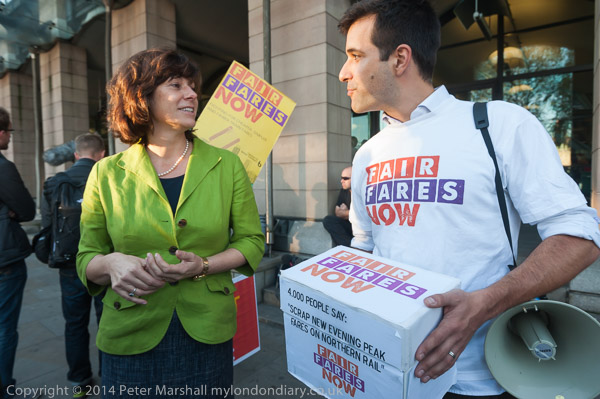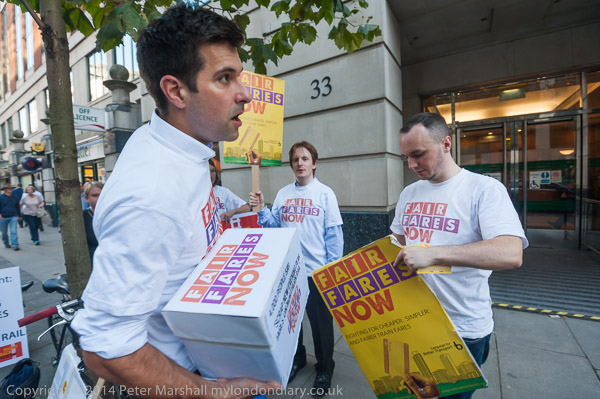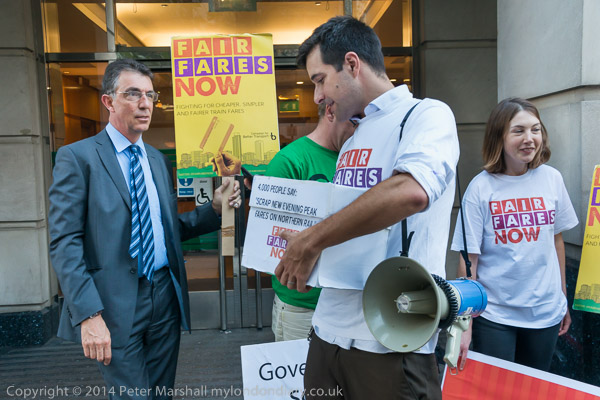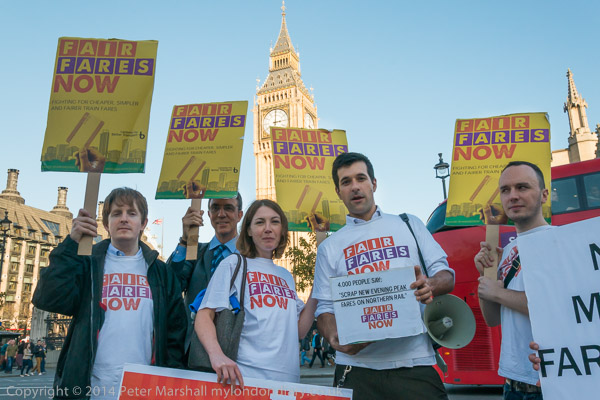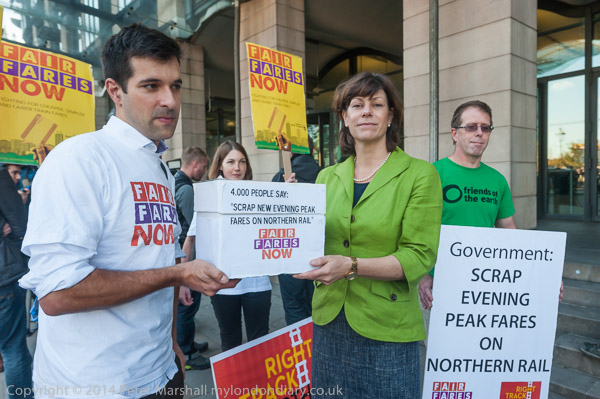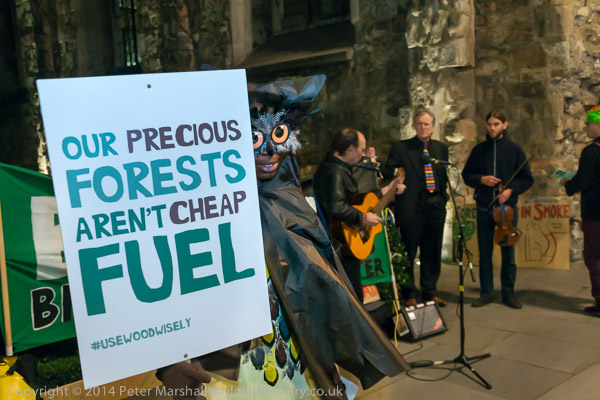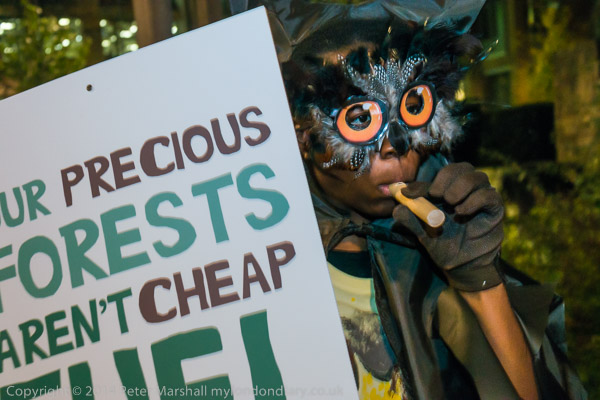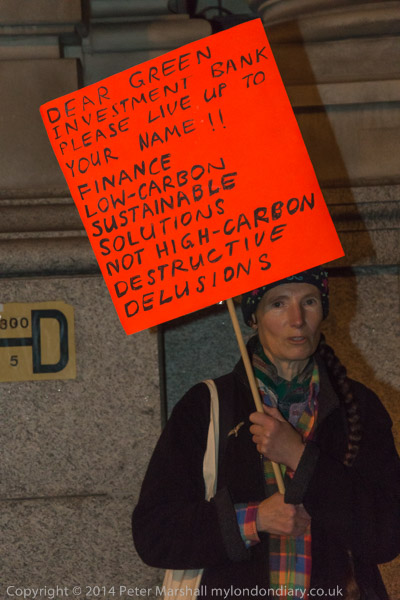AxeDrax Wood Burning & Student Housing: Today, 19th October, is the International Day of Action Against Big Biomass (IDoA) calling for an end to climate-wrecking tree burning in power stations, and I hope to be attending a protest in London at Barclay’s Bank in Canary Wharf at noon calling for an end of the £billions in subsidies given to the world’s biggest tree burner, Drax, for burning trees and polluting communities. In 2016 I photographed a protest against Drax and another against providers of high cost (and high profit) housing for students.
AxeDrax protest against Biomass & Coal – Westminster
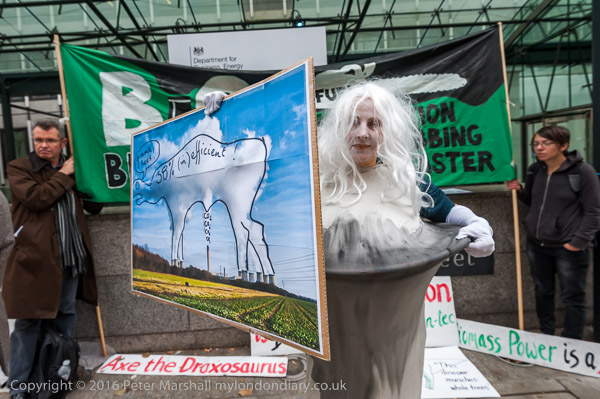
Back on Wednesday 19th Oct 2016 protesters came to the newly formed Dept of Business Energy and Industrial Strategy (BEIS) to urge the government to end the green subsidies to Drax as scientific research had make it clear that producing electricity from Biofuels is harmful to the climate, forests, biodiversity and people.
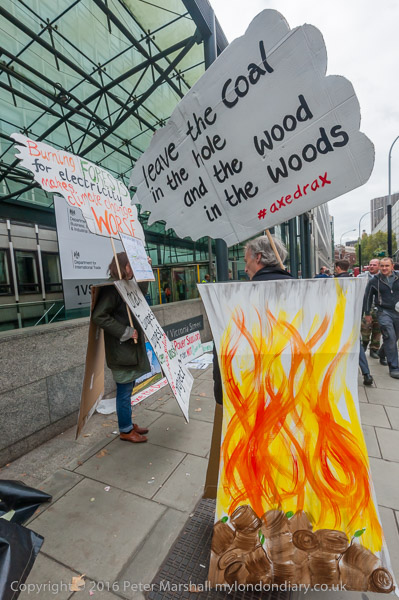
Biofuel Watch and London Biomassive, both part of the Axe Drax campaign had brought with them posters, banners and a cooling tower and were accompanied by the Draxosaurus dinosaur.
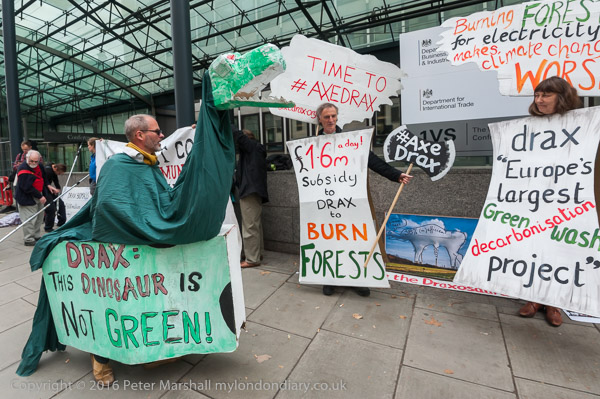
They demanded the government end the £600million a year subsidy Drax gets for its polluting activities and spend the money on measures such as building insulation to cut demand for electricity and to support the use of real low-carbon renewable electricity generation.
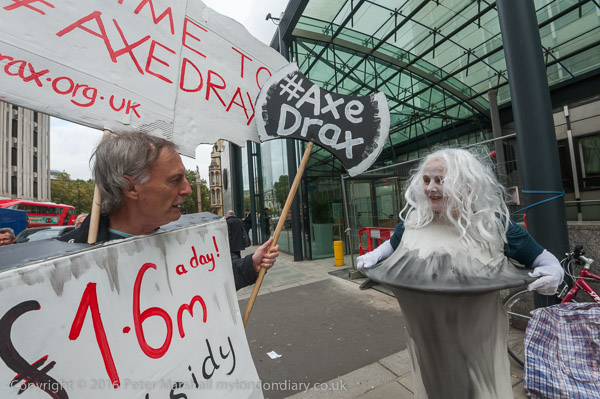
Drax is an old and inefficient power generator, built for coal, still used in two of its six boilers in 2016, though in April 2023 they announced using coal had come to an end. The four boilers converted to wood pellet use waste 60% of the energy created in waste heat to the atmosphere and into the cooling water taken from and discharged into the nearby river Ouse. Without the huge annual subsidies it gets from our electricity bills it would not be viable. It should be closed as soon as possible and its workers trained for new green jobs which the huge subsidies currently spent on keeping this highly polluting facility open could provide.
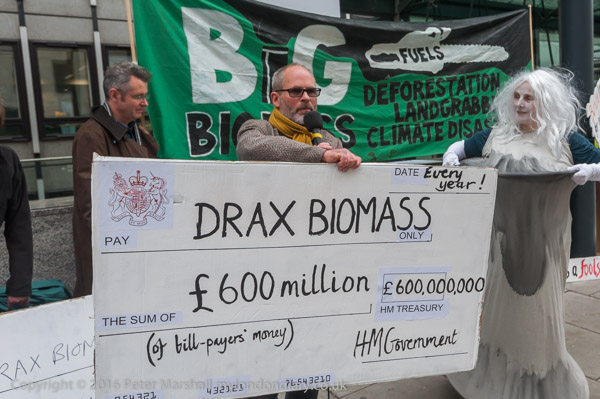
As well as being generously awarded for adding excessive amounts of carbon and thus increasing global temperatures, Drax also creates large amounts of highly dangerous particulates, releasing over 400 tons a year into the environment in the UK. And Drax also creates environmental havoc in the areas which supply its wood – and until 2023, coal.
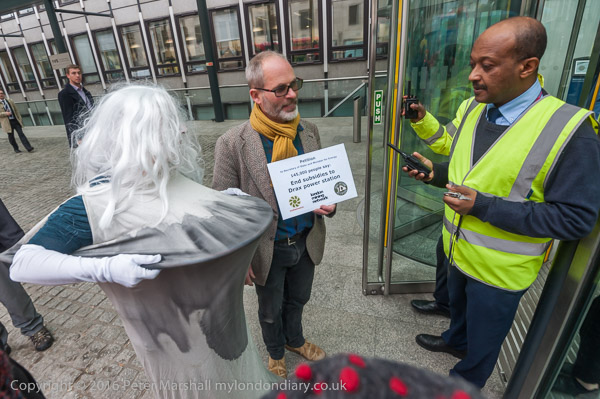
Much of the wood comes from destroying forests in the Southeast of the United States, and Drax also supplies wood to be burnt in other countries. It has mills to turn freshly cut trees into wood pellets in Louisiana, Alabama, Mississippi, and Arkansas. Planting the monoculture pine forests needed to supply these has been at the expense of the clear cut felling of older diverse forests and replacing them with sterile plantations with little undergrowth and wildlife.
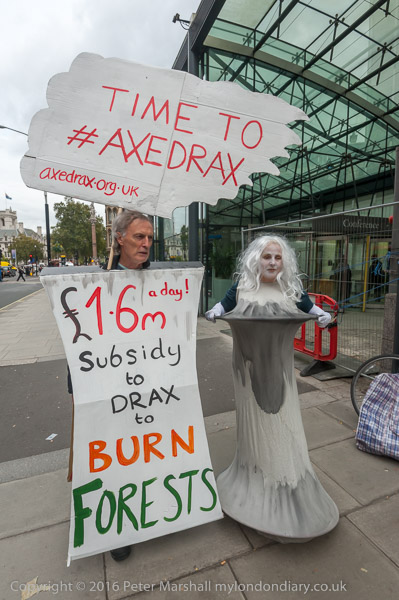
Drax also buys wood pellets from the world’s largest pellet producer Enviva which cuts down large areas of highly diverse coastal hardwood forests in the US with an incredible loss of bio-diversity. Similar environment degradation and destruction of habitats is taking place in other countries around the world where Drax sources pellets. Their transportation to Drax also produces large amounts of carbon dioxide.
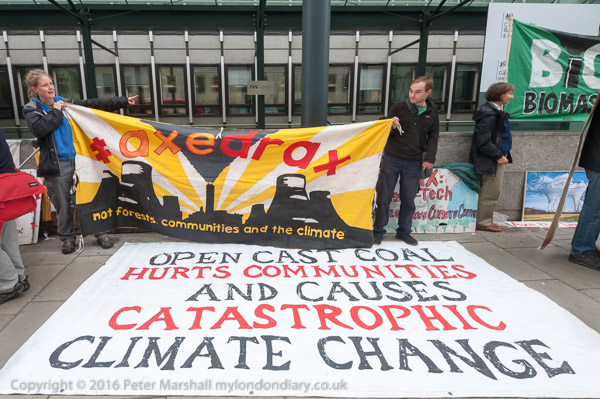
The pellet plants which produce wood largely from whole trees and complete felling of large forest areas to be burnt at Drax also generate huge amounts of air pollution both at Drax in Yorkshire and Drax at the US pellet plants were Drax has had to pay large fines for this. Most of these plants are in deprived, majority-Black communities.

At the protest at the BEIS we heard a from a Colombian woman about the calamitous effect of open-cast coal-mining at the giant open-pit Cerrejón coal mine in La Guajira, northern Colombia. jointly owned by Anglo American, BHP Billiton and Glencore Xstrata.
Drax may now have ended burning coal and imports ended in 2020, but following the closure of UK mines all of the coal burnt there came from abroad, including from Colombia.

The Cerrejón mine is in Wayúu indigenous territory and the local people were not consulted when mining began there 30 years ago. Their land was simply seized and communities forcibly displaced in violation of their constitutional land rights and there was no proper compensation. Pollution and dust from the coal mine continues to contaminate the air and water supplies badly affecting traditional lifestyles; soil pollution leads to failed crops, and fishing areas have been contaminated.

Drax also had a carbon capture and storage project for its biomass plants, but this is only based on very limited trials and seems highly unlikely to ever have a significant effect, not least because the necessary infrastructure for the removal and storage of any carbon dioxide captured seems unlikely ever to be available. And by the time both the removal and disposal could possibly be implemented on any scale there will be absolutely no economic justification for retaining expensive sources of power such as wood burning rather than very much cheaper renewable generation.
AxeDrax protest against Biomass & Coal
Student Rent Strike protest – Holborn

I went on from the BEIS protest to Russell Square where students were meeting to discuss student housing. Once halls of residence were largely an at-cost service provided by universities, but have now become big business for private developers.
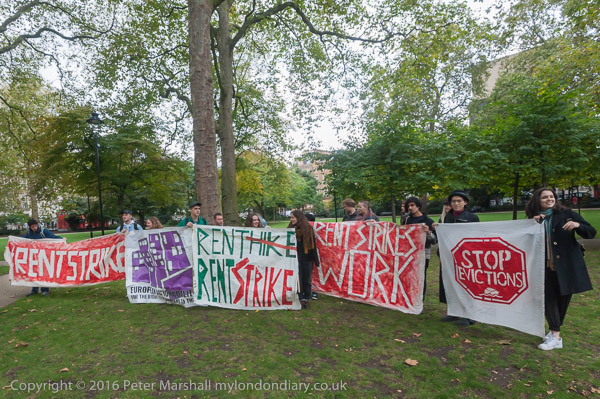
After some speeches they marched behind the #RENTSTRIKE banner to briefly occupy the nearby office of Unite Students, a FTSE 250 company housing around 50,000 students in the UK.
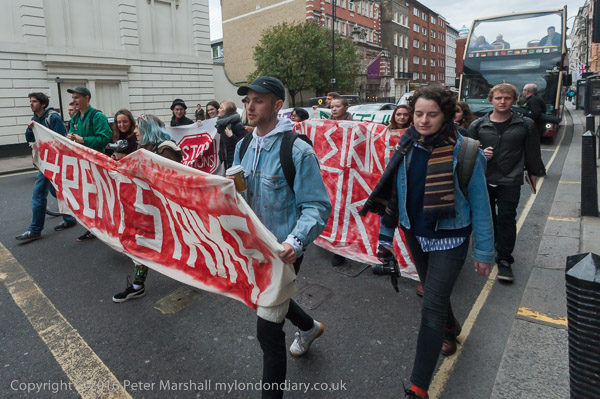
The event was a part of a nationwide series of protests taking place as investors and developers were discussing the rich profits to be made from students at the MIPIM conference, the world’s largest real estate market event in Cannes.
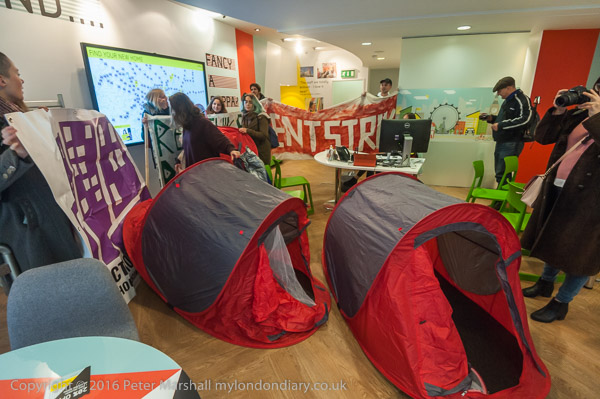
Many of the large new blocks of student housing have flats with rents larger than the entire student loan, higher than all but students from very wealthy families can afford, and are largely for letting to rich overseas students studying here.
More pictures at Student Rent Strike protest.
